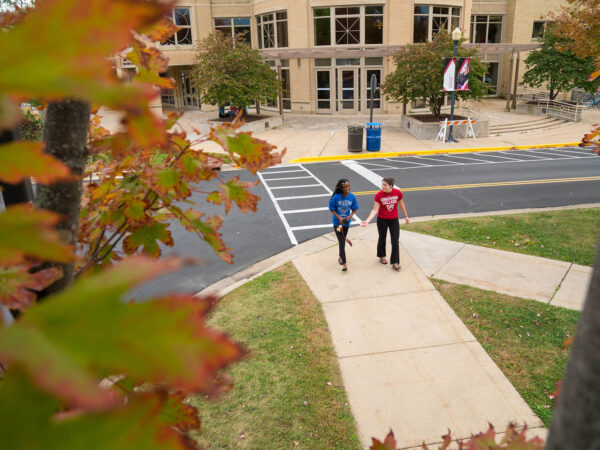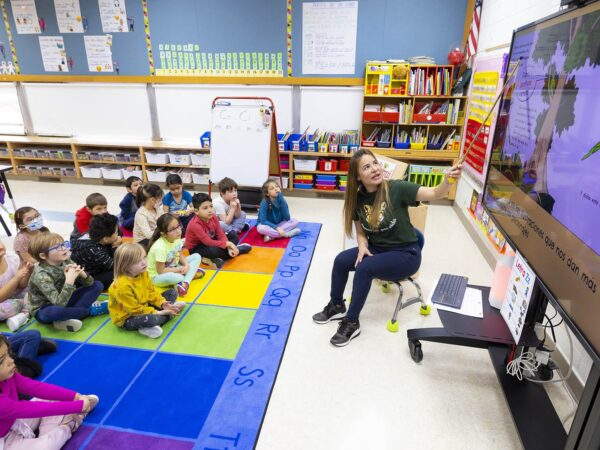License in Special EducationHenry Predolin School
Unique teaching opportunities
As a student enrolled in the Special Education program at Edgewood College, you will have the opportunity to work in the Cutting Edge, a unique college campus outreach program for individuals with disabilities who are currently undereducated and underemployed. Involvement with Cutting Edge students occurs through two course practicums. Our program is based in culturally-relevant socially just pedagogy with restorative justice practices, ensuring that the needs of today’s learners in inclusive classrooms are our priority.
Licensing for Teachers
- Structured toward working professionals
- Strong community and individualized support
- Fast track to licensure
- Instructors bring real-world experience and school partnership
- Individuals with License with stipulations are welcome in our program
Master’s Degree & Advanced License
Obtain your master’s degree in conjunction with an advanced special education license by completing just 6 additional credits.
Madison, WI
On-campus
Career Outcomes
Teachers who are licensed in Special Education are in high demand in Wisconsin schools. A recent analysis of our graduates found that 100% of the students who completed the Edgewood College Special Education License program received DPI certification and were placed in special education teaching positions within one year of graduation.
Featured Courses in Special Education
EDU 635 – ESL Curriculum Design & Assessment
This course provides an overview of pedagogies to teach multilinguals. Course content explores the role of scaffolding instruction and the integration of academic reading, writing, listening and speaking. Students will learn strategies for fostering classroom talk, collaborative group work, and intentional language instruction in content areas. A focus on assessment use, both summative and formative and in language and content, is embedded throughout.
EDU 602 – Disability and Marginality
This blended course is a comprehensive overview of differences and exceptionalities for children and youth identified in high and low incidence areas of disability. The high incidence areas of Emotional Behavioral (EBD), Intellectual (ID), or Specific Learning Disabilities (SLD) are primary to the course. Introductory and foundational competency will be attained in areas which include, but are not limited to: Autism Spectrum Disorder; Speech and Language; Other Health Impaired; Orthopedic Impairments, Visual Impairments, Deaf & Hard of Hearing; Traumatic Brain Injury and At-Risk. The historical & legal foundations of cross categorical special education for children and youth including Individuals with Disabilities Education Act; ADA & Section 504; WI PI 34 Child Find, Referral Process; and the collaborative roles between general and special education will also be discussed. Candidates will be involved in collaborative group discussions and practicum experiences enabling them to demonstrate their abilities to relate to children and adults of all backgrounds.There may be specific focus on individuals from high incidence groups. Additional specific competencies attended to in this blended course include the following: identifying and understanding the implications of atypical childhood, understanding the specific characteristics of each disability area, understanding the life-long effects of each disability, and becoming competent in the history of and basic components of the legal foundations to special education in inclusive learning environments. Practicum may be required based upon the candidate’s background.
EDU 604 – Transition I & Family Process
This course is a comprehensive overview of career and transition planning for the full spectrum of individuals with disabilities. Additionally, as a result of this class, students will be able to identify and participate in the objectives as identified by the Council of Exceptional Children, Division on Career Development and Transition as desirable competencies for secondary special educators. Through the lens of Social Justice and considering ethical practice, the affects of disproportionality in transition education will be in the forefront. Candidates will be provided access to specialized supports and strategies for working with marginalized demographic youth, and their families.Finally, candidates will meet the requirements of the Wisconsin Department of Public Instruction relative to transition and family involvement issues. This course will provide an introduction to the effects of different disabilities on student career, vocational, and transition and student readiness for adult independence. Focus will involve the identification and study of effective and ethical practices and transition-related skill development for both inservice and preservice professional practitioners. Special emphasis will be placed upon families and family involvement, as related to State of Wisconsin supports and parent and family rights in the transition process.
Related Programs
Frequently Asked Questions about License in Special Education
What are the admission requirements for this program?
New students may start their program at five entry points throughout the year. Please note priority deadline dates.
Fall Session I – August 1 (August start)
Fall Session II – October 1 (October start)
Spring Session I – January 2 (Jan start)
Spring Session II – March 1 (March start)
Summer Session – May 1
All required application materials should be submitted by deadlines. Applications received after deadlines will be reviewed on a case-by-case basis. Questions? Contact Joann Nowka, jnowka@edgewood.edu, 608-663-4247.
Admission Requirements
- Provide evidence of a baccalaureate or more advanced degree from a regionally accredited or equivalent post-secondary institution with a cumulative grade point average of at least 2.75 on a 4.0 scale for regular admission status. The cumulative grade point average is computed on the highest degree held at the time of application to the Edgewood College graduate program.
- Request that official transcripts for all undergraduate and graduate academic credits received from each post-secondary institution that you have attended.
- Provide two letters of recommendation from college or university professors, supervisors and/or professional colleagues who can focus on the candidate’s probability of success in graduate school.
- Submit a written statement listing the reasons that you will be successful in graduate school your passion for teaching special education: cite how specific background experiences will aid in your success as a student.
- International students must contact Graduate and Professional Studies for additional admission requirements. Learn more.
Possible Assessments
- Praxis Core may be required depending upon Entry GPA
- Content PRAXIS II 5146 may be required
- ESL PRAXIS II may be required for ESL
Can I transfer credits from a different institution towards this program?
You may submit up to 12 semester hours of graduate credit for consideration of transfer to Edgewood College for application to a degree program. Approval of the respective department is required. To be considered for application to a degree program, a course must have been taken within the past five years. For more information about transfer credits, please contact your admissions counselor.


